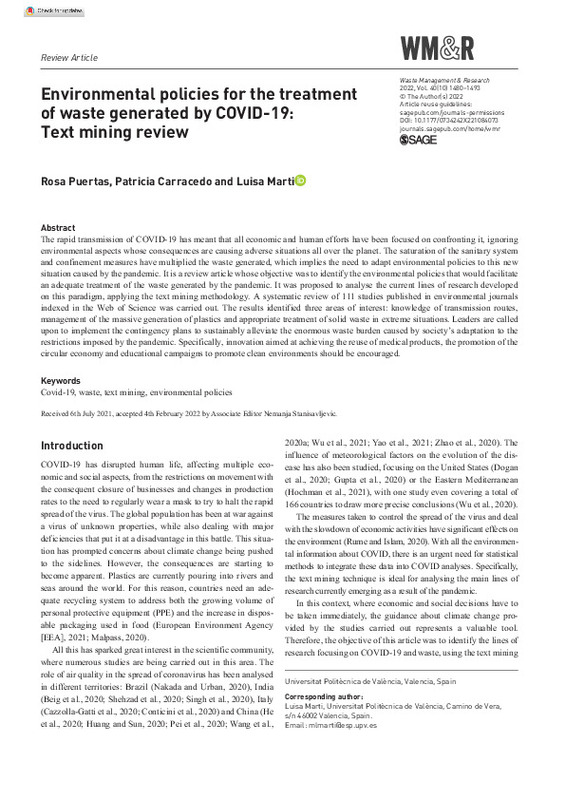JavaScript is disabled for your browser. Some features of this site may not work without it.
Buscar en RiuNet
Listar
Mi cuenta
Estadísticas
Ayuda RiuNet
Admin. UPV
Environmental policies for the treatment of waste generated by COVID-19: Text mining review
Mostrar el registro sencillo del ítem
Ficheros en el ítem
| dc.contributor.author | Puertas Medina, Rosa María
|
es_ES |
| dc.contributor.author | Carracedo-Garnateo, Patricia
|
es_ES |
| dc.contributor.author | Martí Selva, María Luisa
|
es_ES |
| dc.date.accessioned | 2023-12-05T19:03:28Z | |
| dc.date.available | 2023-12-05T19:03:28Z | |
| dc.date.issued | 2022 | es_ES |
| dc.identifier.issn | 0734-242X | es_ES |
| dc.identifier.uri | http://hdl.handle.net/10251/200523 | |
| dc.description.abstract | [EN] The rapid transmission of COVID-19 has meant that all economic and human efforts have been focused on confronting it, ignoring environmental aspects whose consequences are causing adverse situations all over the planet. The saturation of the sanitary system and confinement measures have multiplied the waste generated, which implies the need to adapt environmental policies to this new situation caused by the pandemic. It is a review article whose objective was to identify the environmental policies that would facilitate an adequate treatment of the waste generated by the pandemic. It was proposed to analyse the current lines of research developed on this paradigm, applying the text mining methodology. A systematic review of 111 studies published in environmental journals indexed in the Web of Science was carried out. The results identified three areas of interest: knowledge of transmission routes, management of the massive generation of plastics and appropriate treatment of solid waste in extreme situations. Leaders are called upon to implement the contingency plans to sustainably alleviate the enormous waste burden caused by society's adaptation to the restrictions imposed by the pandemic. Specifically, innovation aimed at achieving the reuse of medical products, the promotion of the circular economy and educational campaigns to promote clean environments should be encouraged. | es_ES |
| dc.language | Inglés | es_ES |
| dc.publisher | SAGE Publications | es_ES |
| dc.relation.ispartof | Waste Management & Research | es_ES |
| dc.rights | Reserva de todos los derechos | es_ES |
| dc.subject | Covid-19 | es_ES |
| dc.subject | Waste | es_ES |
| dc.subject | Text mining | es_ES |
| dc.subject | Environmental policies | es_ES |
| dc.subject.classification | ECONOMIA APLICADA | es_ES |
| dc.subject.classification | ESTADISTICA E INVESTIGACION OPERATIVA | es_ES |
| dc.title | Environmental policies for the treatment of waste generated by COVID-19: Text mining review | es_ES |
| dc.type | Artículo | es_ES |
| dc.identifier.doi | 10.1177/0734242X221084073 | es_ES |
| dc.rights.accessRights | Abierto | es_ES |
| dc.contributor.affiliation | Universitat Politècnica de València. Escuela Politécnica Superior de Alcoy - Escola Politècnica Superior d'Alcoi | es_ES |
| dc.contributor.affiliation | Universitat Politècnica de València. Facultad de Administración y Dirección de Empresas - Facultat d'Administració i Direcció d'Empreses | es_ES |
| dc.description.bibliographicCitation | Puertas Medina, RM.; Carracedo-Garnateo, P.; Martí Selva, ML. (2022). Environmental policies for the treatment of waste generated by COVID-19: Text mining review. Waste Management & Research. 40(10):1480-1493. https://doi.org/10.1177/0734242X221084073 | es_ES |
| dc.description.accrualMethod | S | es_ES |
| dc.relation.publisherversion | https://doi.org/10.1177/0734242X221084073 | es_ES |
| dc.description.upvformatpinicio | 1480 | es_ES |
| dc.description.upvformatpfin | 1493 | es_ES |
| dc.type.version | info:eu-repo/semantics/publishedVersion | es_ES |
| dc.description.volume | 40 | es_ES |
| dc.description.issue | 10 | es_ES |
| dc.identifier.pmid | 35282720 | es_ES |
| dc.relation.pasarela | S\458173 | es_ES |








